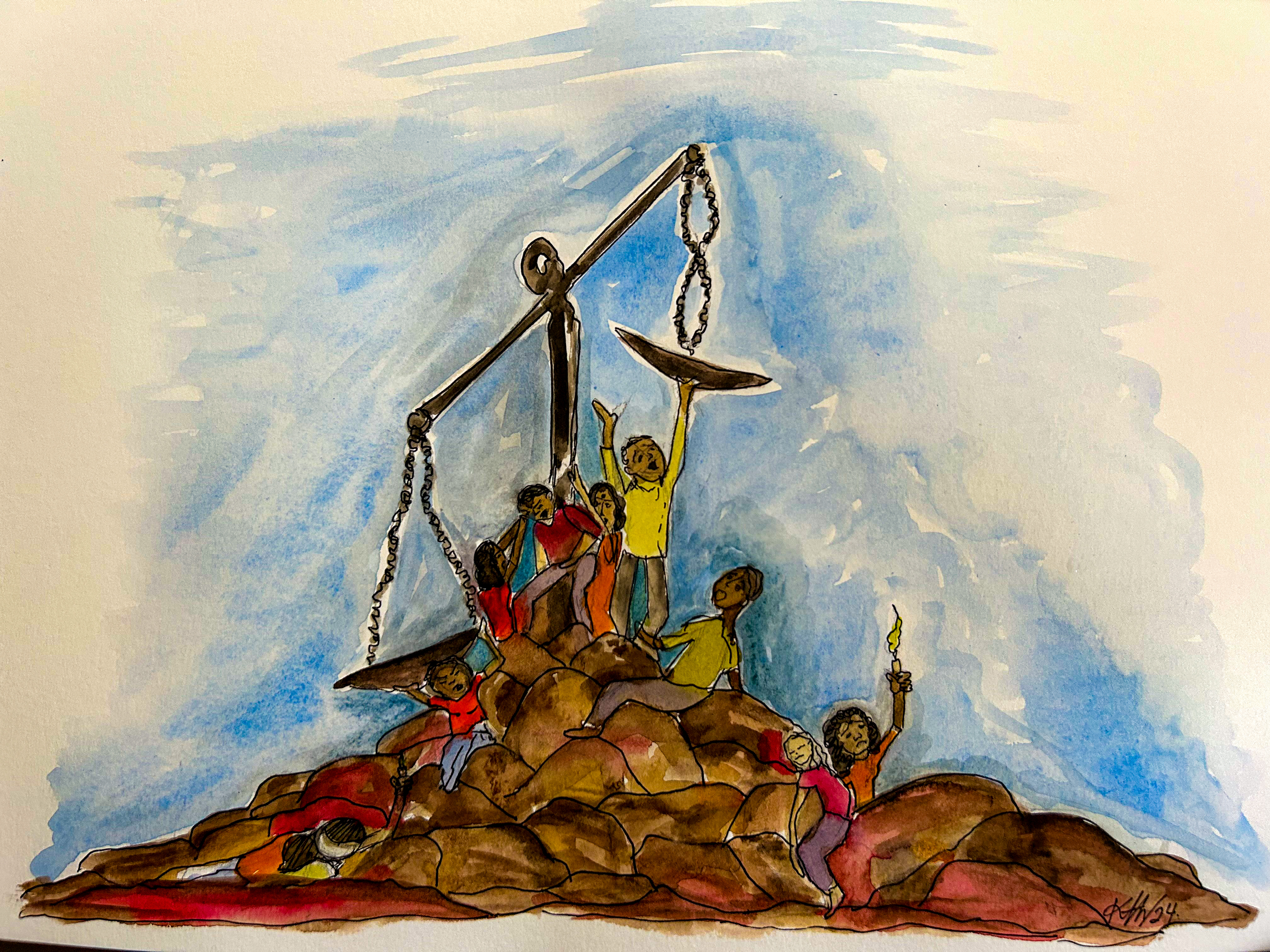Illustration by Keera Ratnam / wavesofcolour
Tamils across the world marked the 15th anniversary of the massacres at Mullivaikkal last week. Thousands gathered, en masse in public commemorations and in private ceremonies at homes, to pay tribute to those who were killed by the Sri Lankan state. As they did so, they were clear in who they paid tribute to – the victims of a deliberate and systematic genocide.
From all perspectives, including legally, the Mullivaikkal massacres meet the definition of the word ‘genocide’. Indeed, the term had been used to describe the state’s treatment of Tamils prior to 2009. Alarm bells rang long before bombs were being dropped on civilians who were instructed to gather in designated ‘No Fire Zones’. The island’s brutal history of massacres and pogroms from 1958 onwards, numerous discriminatory laws, dismissal of Tamil demands for equality and repeated racist statements from Sri Lankan leaders made the intent behind the repression clear. Throughout its post-independence history, the Sri Lankan state refused to tolerate an independent Tamil identity that was not subservient to Sinhala Buddhism. Any dissent would be brutally crushed. The events at Mullivaikkal made that chauvinism impossible to ignore.
As Sri Lankan troops invaded the Vanni, in December 2008 the Genocide Prevention Project compiled a Mass Atrocity Crimes Watch List, with Sri Lanka just one of eight countries where a genocide was either ongoing or at risk of taking place. Scholars and experts worldwide, as well as the hundreds of thousands who took to the streets, were clear in their condemnation. As Colombo’s campaign of indiscriminate shelling, repeated targeting of civilians, executions of those who attempted to surrender, rape, torture and internment of more than 300,000 people came to a close, the logic behind it was clear. The Sri Lankan state was deliberately attempting to eliminate the Eelam Tamil people.
Current conflicts in Ukraine and Myanmar, and especially the bombardment of Gaza, are leading many to now reflect on the horrors of Mullivaikkal. The parallels are difficult to ignore. But in doing so, they must not whitewash the atrocities that took place. Attempts in the South to commemorate “all lives” lost in the conflict, ceremonies which Sri Lanka permits to take place without state harassment, distort the fact that it was Tamils who were targeted. It was disheartening, but unsurprising to see no mention of the word “genocide” in any of those events. This was in stark contrast to commemorations in the North-East and diaspora centres globally. Refusing to acknowledge that it was the Tamil people who were persecuted in such a manner, and have been for decades, obfuscates the repression they face. The Southern events fail to consider how decades of state racism led to the slaughter of more than 169,000 Tamils in 2009. Moreover, it allows the state to cover under the “fog of war” and attempt to justify their actions as within international norms. This was not a war on terror, as Sri Lanka continues to claim. It was a war on the Tamil people.
To this day, that war has not stopped. Alongside the continued violence the Tamil people face, a point that the United Nations human rights chief has spoken out on repeatedly, the state has intensified its process of colonisation of the Tamil homeland. The construction of Buddhist structures has accelerated and settlers continue to encroach on Tamil areas despite Sri Lanka’s pitiful economic situation. All of this is enacted by the government with the blessings of extremist monks and the brute force of the almost entirely Sinhala military. The goal is clear; to eliminate the Tamil nation and establish the island as a bastion of Sinhala Buddhism.
The reluctance to recognise the killings for what they were may in part be because it would mean accepting that there was a failure of the international community to act when it should have. States have a duty to protect and prevent genocides from happening. In the case of Sri Lanka though, despite the ample evidence and desperate pleas, governments around the world instead enabled it.
That is, however, beginning to change. In capitals around the world, from Washington D.C. to London to Ottawa, influential figures are recognising the importance of using the term. There is a growing understanding that only through recognising genocide took place, that the underlying causes behind the decades of instability of the island can be addressed. This would not have been possible were it not for the determination of Tamils who braved ongoing surveillance, harassment and intimidation from Sri Lanka’s security forces to gather and speak out against the genocide, as they have done every year since the massacres took place. If true peace is ever to be found their voices that must be heeded.
We need your support
Sri Lanka is one of the most dangerous places in the world to be a journalist. Tamil journalists are particularly at threat, with at least 41 media workers known to have been killed by the Sri Lankan state or its paramilitaries during and after the armed conflict.
Despite the risks, our team on the ground remain committed to providing detailed and accurate reporting of developments in the Tamil homeland, across the island and around the world, as well as providing expert analysis and insight from the Tamil point of view
We need your support in keeping our journalism going. Support our work today.
For more ways to donate visit https://donate.tamilguardian.com.


